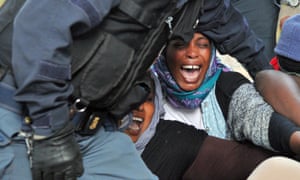Police on Italy’s border with France have forcibly removed about a hundred migrants who were stranded in the Italian city of Ventimiglia and denied entry into France, escalating tensions between the two countries over the free movement of migrants to northern Europe.
The chaotic scene in Ventimiglia – the Italian city where migrants have been sleeping on rocks overlooking the French border – was called a “punch in the face to all the European countries that want to close their eyes” to the migrant crisis, said Angelino Alfano, Italy’s interior minister.
Some of the migrants – who are mostly from Sudan and Eritrea – were resisting police and trying to hang on to signposts in their desperate attempt to make their way across the border, according to media reports.
They were loaded on to a bus and brought to the city’s train station, where the Red Cross is leading assistance efforts. Similar temporary aid stations are popping up all over Italy, including in train stations in Milan and Rome.
In some cases, migrant families in Ventimiglia making the trek to northern Europe have been separated, with some successfully making their way to Paris and beyond, while others have been turned back.
Tensions between Rome and Paris have risen dramatically after France closed the border to the migrants amid accusations that Italy was not properly processing the refugees.
The French interior minister, Bernard Cazeneuve, said 6,000 migrants had been returned to Italy so far.
France’s position has been rejected as untenable by the Italian prime minister, Matteo Renzi, who said on Monday that it ran contrary to a European agreement that the ongoing migrant crisis was a shared burden.
The issue is likely to be at the top of the agenda when Renzi meets France’s president, François Hollande, on Sunday. He is also due to meet David Cameron in Milan on Wednesday, when the British prime minister visits the expo fair.
“If Europe wants to be Europe, it has to take on this problem as a single bloc. This is plan A. The muscular stance of some ministers of some friendly countries goes in the opposite direction,” Renzi said on Monday.
He added: “If it’s Italy’s problem because Europe closes its eyes, then Italy will do it on its own. But in that case it would be a defeat not for Italy, but for the very idea of Europe.”
Ventimiglia’s mayor, Enrico Ioculano, who said he was not warned about the police action, said a political solution was required to end the stalemate. In Italy, the humanitarian crisis has been made even more difficult because of the staunch opposition against Renzi – and anti-immigrant fervour – among some rightwing governors, which has put pressure on local officials.
Ioculano told journalists that he had sought some regional assistance to help the city cope with the influx of migrants, but said the request was denied by the conservative governor of Liguria, Giovanni Toti, who has said the area would not offer any humanitarian assistance to migrants.
Governors in Lombardy and Veneto have also rejected a proposal by Renzi’s government in Rome for all Italian regions to accept some of the migrants who are landing on the country’s shore in the south.
In Veneto, the freshly re-elected governor, Luca Zaia, has ordered all local authorities to remove migrant housing and other dwellings from areas close to tourist destinations, saying their presence would have a “devastating” impact on tourism in the region around Venice.

View all comments >
comments
Sign in or create your Guardian account to join the discussion.
This discussion is closed for comments.
We’re doing some maintenance right now. You can still read comments, but please come back later to add your own.
Commenting has been disabled for this account (why?)